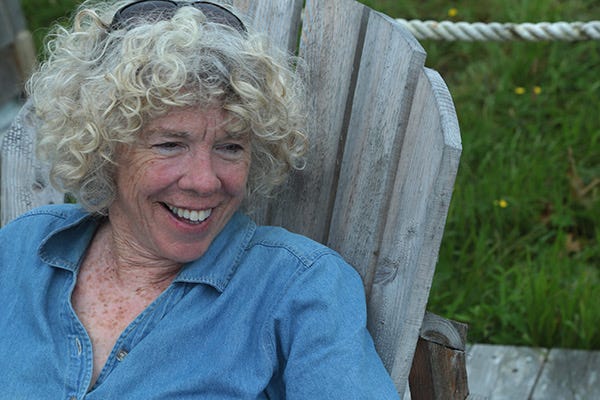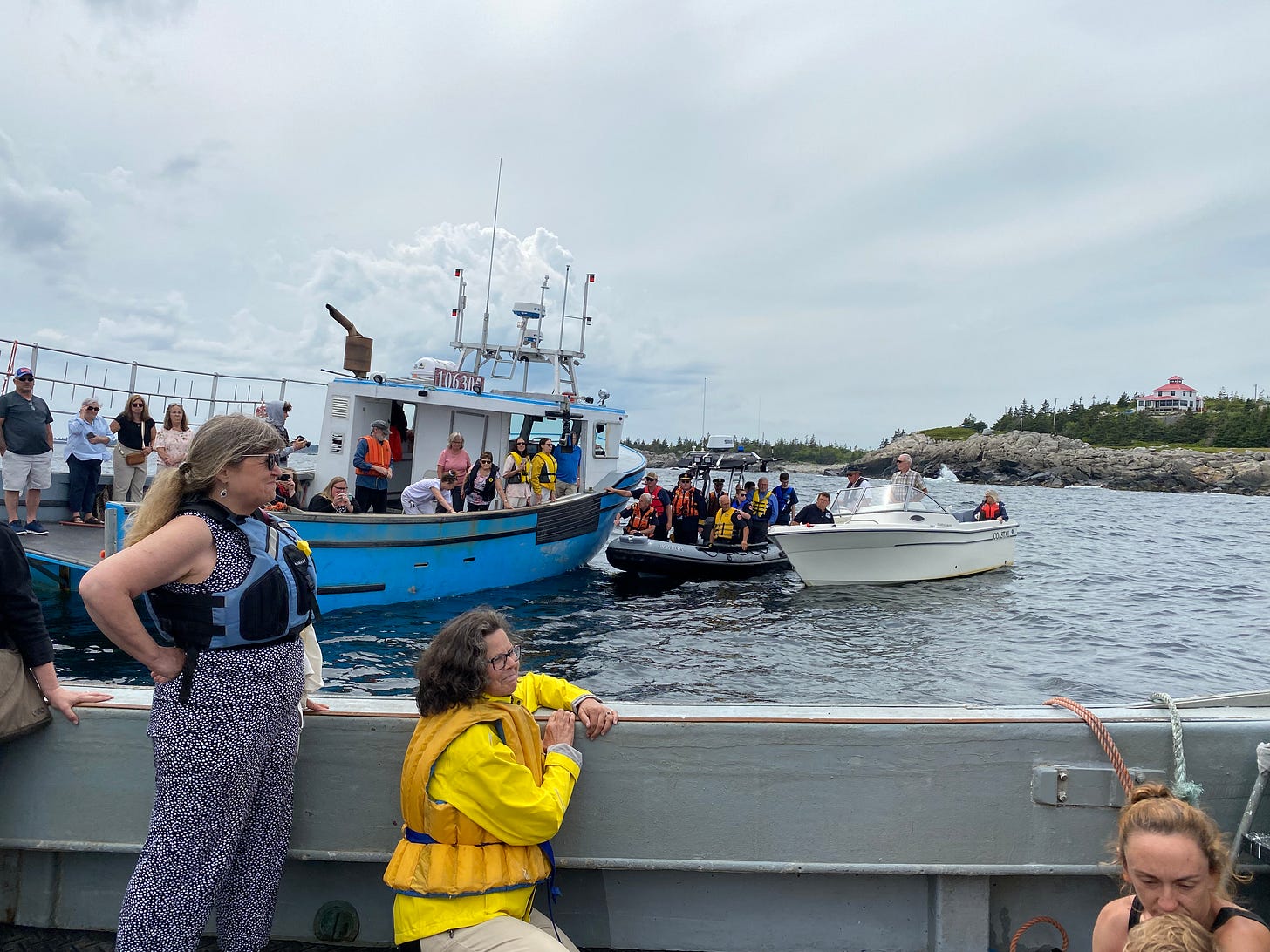Rachel Summers, of Port Medway, Nova Scotia, died on September 4, 2021. Her ashes were scattered at sea on July 3, 2022. My description of this event was first published by The Globe and Mail, on September 20, 2022. Rachel would have been 75 years old this June 24.
Toronto, June 22, 2023
Buried at sea
Rachel told her friends that when she died she wanted to be buried at sea. She said she intended to feed the fishes. “It seems only fair,” said Rachel. “I’ve eaten a lot of halibut and cod in my day. This will be a way of giving back.”
Rachel lived by herself in a small fishing village on Nova Scotia’s south shore. Her house was next to a working lighthouse on high cliffs overlooking the Atlantic. The sea was in her soul. Her greatest joy was kayaking along the rocky coast in the morning fog. Perhaps her love of the sea was where the feed-the-fishes idea came from. Anyway, her friends thought that what she said about being buried at sea was just a casual comment and didn’t pay it much attention. “Sure,” we said, “we’ll do that. That’s a promise. Whatever.” After all, Rachel was full of life. She wasn’t going anywhere any time soon, that’s for sure. Which was a good thing, because we loved her.
And then, suddenly, astonishingly, Rachel died of a massive stroke. Her friends, sick with grief, didn’t know what to do. Had she really wanted to be buried at sea? Was that even possible? We investigated. We discovered that in Canada you can dispose of a body in open waters, but to do so you need a special permit, the regulations and requirements are strict, and the approval process takes a long time. But ashes from a cremation can be freely scattered just about anywhere. In our sadness, trying to be practical, that’s what we decided to do. We would scatter Rachel’s ashes at sea. The fishes would not get much out of it, but Rachel would have understood. Even in death you have to compromise and Rachel was a realist as well as a romantic.
And so, one summer Sunday afternoon, Rachel’s many friends gathered at the meeting hall near the village’s government wharf. Firemen from three volunteer fire departments were there. Rachel, a nurse, had been an intrepid first responder. When the department was practising rescues at sea Rachel was always the first to jump into the water, pretend to be drowning, and ask to be saved. The firemen who had worked with her in local emergencies were determined to show their respect and affection. They wore dress uniforms with gold braid. They came in their fire trucks, lights flashing. At the hall, people spoke lovingly about Rachel. Then we all solemnly walked to the wharf. The firemen formed an honour guard. The fire trucks slowly drove down to the jetty.
The boats were ready for us. There were two commercial fishing boats. There were two volunteer fire department sea rescue boats. A cabin cruiser owned by someone in the village completed the flotilla. We boarded the boats from the wharf, climbing down ladders. Lines were cast off. We set out to sea. We steamed slowly along the coast, heading for a spot beneath the cliffs on which Rachel’s house stood. There was a slight breeze. The boats rocked a bit. It was sunny. There was sadness on board, but also a quiet good humour, even a certain contentment, happiness almost, the sense that we were doing a good thing, that Rachel would have approved. People smiled at each other.
It took twenty minutes of steaming to get to the foot of the cliffs. A group had gathered on the promontory up above, by the lighthouse, to watch the ceremony below. The boats throttled their engines back, occasionally manoeuvring to avoid colliding with each other. The wind picked up and the current was strong. Idle chatter stopped. A friend of Rachel’s experienced in funerals had brought Rachel’s ashes in a cardboard container. She stood at the end of one of the fishing boats, holding a bible, and spoke. Her strong voice carried across the water to the other boats. She described Rachel’s life as joyous, passionate and determined. She said Rachel’s life had brought meaning out of the abyss and her friends would not let that life go to waste. She quoted from a poem by Clive James: “A pause to grieve/Buried by the starlight/Of our lives laid bare…”
The officiating friend invited those on board to take turns spooning Rachel’s ashes into the sea. We did that. As we did, the firemen in their sea rescue boats stood up and saluted. The boats sounded their horns. The lighthouse foghorn sounded mournfully from the top of the cliffs. Then the ashes were gone, into the sea, some carried far off by the strengthening wind. The boats turned for home, heading back to the government wharf.
Afterwards there was a reception at the firehall. A villager gave the traditional blessing of the fleet. “Bless this fleet and all who serve. Protect them from wind and rain and the dangers of the deep. Return them always to this harbour in your light and peace.” Sandwiches and coffee were offered. “Oh good, party sandwiches,” said a person at our table. “I love party sandwiches.” She was gently corrected by someone. “These are not party sandwiches. These are funeral sandwiches.”
We had buried Rachel at sea. We had done the best we could. The speeches at the meeting hall, the fire engines with their flashing lights, the fire department honour guard slowly walking down to the wharf, the steaming out to sea in fishing boats, the scattering of the ashes into the ocean, the wailing of the foghorn from the lighthouse on the cliffs, the blessing of the fleet, the funeral sandwiches—it was a brilliant tapestry of tradition, romance, grief, and friendship. And a promise was kept.







Beautiful.
Lovely tribute to Rachel. May she rest in peace.